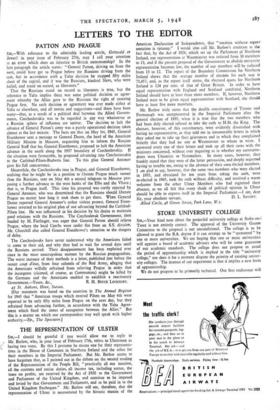LETTERS TO THE EDITOR
PATTON AND PRAGUE
Sta,—With reference to the admirable leading article, Gottwald or Benes? in your issue of February 27th, may I call your attention
to an error which does an injustice to British statesmanship? In the first paragraph the article states : " General Patton, driving on from the west, could have got to Prague before the Russians driving from the
east, but in accordance with a Yalta decision he stopped fifty miles short of the capital, and it was the Russians, kindred Slays, who were hailed, and stand on record, as liberators."
That the Russians stand on record as liberators is true, but the reference to Yalta implies there was some political decision or agree- ment whereby the Allies gave to the Russians the right of entering Prague first. No such decision or agreement was ever made either at Yalta or elsewhere, and all stories and suggestions—and there have been many—that, as a result of a political deal between the Allied Govern- ments, Czechoslovakia was to be regarded in any way whatsoever as a Russian sphere of influence are untrue. The decision to halt the advance of General Patton's army was a purely operational decision taken almost at the last minute. The facts are that on May 1st, 1945, General Eisenhower sent a message to General Deane, the head of the American Military Mission in Moscow, requesting him to inform the Russian General Staff that he General Eisenhower, proposed to halt the American advance in the south along the 1937 boundary of Czechoslovakia. If the situation were favourable, he proposed advancing into Czechoslovakia to the Carlsbad-Pilsen-Budweis line. To this plan General Antonov gave his full concurrence.
Meanwhile, the Czechoslovaks rose in Prague, and General Eisenhower, realising that he might be in a position to liberate Prague much sooner than the Russians, sent on May 4th a second telegram to Moscow pro- posing a further advance to the west banks of the Elbe and the Vltava ; that is, to Prague itself. This time his proposal was curtly rejected by General Antonov, who was determined that the Russians should liberate Prague no matter how long it took them to get there. When General Deane reported General Antonov's rather violent protest, General Eisen- hower reverted to his original plan of not advancing beyond the Carlsbad- Pilsen line. He was influenced in his decision by his desire to maintain good relations with the Russians. The Czechoslovak Government, then headed by M. Fierlinger, was eager that General Patton should relieve Prague, where the local Czechs were under fire from an S.S. division. Mr. Churchill also called General Eisenhower's attention to the dangers of delay.
The Czechoslovaks have never understood why the Americans failed to come to their aid, and why they had to wait for several days until the Russians arrived. Their 43isappoimment has been exploited ever since in the most unscrupulous manner by the Russian propagandists. The worst instance of their methods is a letter, published just before the recent coup d'etat, from four colonels of the Red Army, alleging that the Americans wilfully refrained from relieving Prague in order that the insurgents (claimed, of course, as Communists) might be killed by the Germans and the Americans enabled to establish a reactionary [Our statement was based on the assertion in The Annual Register for 1945 that "American troops which entered Pilsen on May 6th were reported to be only fifty miles from Prague on the next day, but they refrained from advancing further, in accordance with the Yalta Agree- ment which fixed the zones of occupation between the Allies." But this is a matter on which our correspondent may well speak with higher authority.—En., The Spectator.]






























 Previous page
Previous page